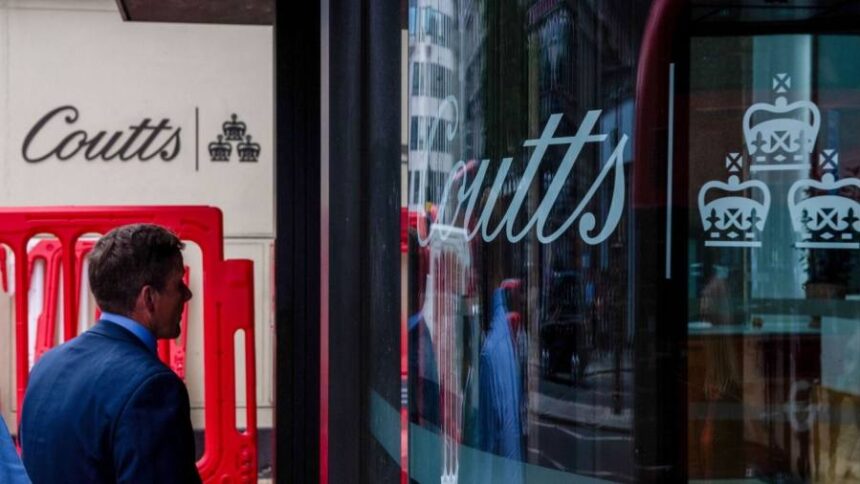Receive free UK banks updates
We’ll send you a myFT Daily Digest email rounding up the latest UK banks news every morning.
“Members of the opposition deserve bank accounts” ought to be a statement of the obvious. But it was a sentiment British MPs felt the need to reiterate this week after Nigel Farage — a driving force behind the Leave vote in the UK’s 2016 Brexit referendum — released parts of a memo showing that Coutts, a private bank owned by the NatWest group, had dropped him as a customer partly on political grounds.
The internal document obtained by Farage shows that Coutts, which is known for its prestigious clientele, factored in the former UK Independence party and Brexit party leader’s opinions on Europe, immigration, and Donald Trump in their decision to close his Coutts account. He was subsequently offered an account with NatWest. Yet, regardless of what one may think of Farage’s views, the incident should cause unease in a country that prides itself on democratic values.
Private financial firms have the right to bar customers who may pose a reputational risk due to involvement in criminality or corruption. This does not apply to Farage, however. And, though the memo shows the bank also considered financial thresholds and costs in their deliberations, it suggests continuing to “bank” the ex-Ukip leader was not compatible with Coutts “given his publicly-stated views that were at odds with our position as an inclusive organisation”. Late on Thursday, the NatWest chief executive Alison Rose apologised to Farage for what she called “deeply inappropriate comments”.
Individuals have the right to lawful free speech, and banks, regulated by the Financial Conduct Authority, have a duty to treat customers fairly. The Farage case also highlights a broader problem around how banks deal with high-profile customers. They must comply with the “politically exposed persons” regime — relating to individuals who could abuse their profile for private gain, and launder the proceeds. Banks have to carry out often costly enhanced scrutiny of PEPs, alongside their families and associates.
The EU-derived rules are more stringent than those in some other jurisdictions as they require tight checks on domestic as well as foreign PEPs. The FCA introduced guidance trying to encourage more flexibility. But a rise in fines and the introduction of corporate criminal offences for failing to prevent fraud have prompted some banks to take extra caution. The upshot is an anti-money laundering regime that is both failing to clamp down sufficiently on “dirty money” flows and unfairly penalising the innocent. Britain’s Chancellor Jeremy Hunt has revealed he, too, was refused a bank account under the regime. Difficulties opening bank accounts also only serve to blight further the attraction of entering politics.
Fighting global dirty money flows does require a rigorous anti-laundering regime. The “Qatargate” scandal in which European parliament members face allegations of being influenced by foreign governments is a case in point. But it should be more clearly defined, and should not be used as cover for barring customers based on their political beliefs.
Authorities should work closely with the banking sector to clarify the red lines. The FCA should also re-emphasise that legally-held political beliefs are irrelevant in any decision on customers — and be ready to investigate and penalise banks that unfairly deny services to clients they disagree with. The government’s announcement on Thursday that it will increase the notice period before accounts are terminated and require banks to provide more details on the grounds is welcome.
The Farage case underscores the difficulty banks face in navigating the “culture wars”. Clarity from the authorities and transparency from financial firms would help douse the flames. As for NatWest — in which the UK government still holds close to a 40 per cent stake — its inclusivity efforts would do better to focus on widening access to its banking services, including for the 1mn-plus British adults who have no account at all.








